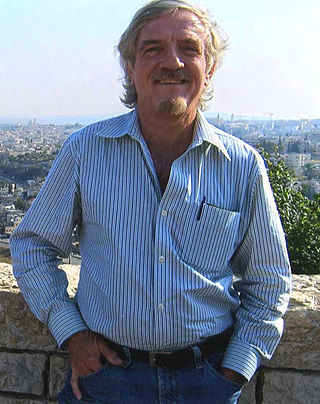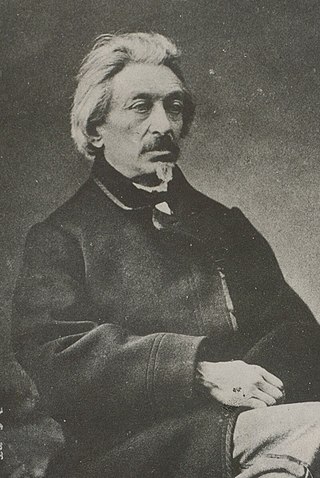
Orthodox Judaism is the collective term for the traditionalist and theologically conservative branches of contemporary Judaism. Theologically, it is chiefly defined by regarding the Torah, both Written and Oral, as revealed by God to Moses on Mount Sinai and faithfully transmitted ever since.

Ashkenazi Jews, also known as Ashkenazic Jews or Ashkenazim, are a Jewish diaspora population who coalesced in the Holy Roman Empire around the end of the first millennium CE. Their traditional diaspora language is Yiddish, which developed during the Middle Ages after they had moved from Germany and France into Northern Europe and Eastern Europe. For centuries, Ashkenazim in Europe used Hebrew only as a sacred language until the revival of Hebrew as a common language in 20th-century Israel.

Qualitative research is a type of research that aims to gather and analyse non-numerical (descriptive) data in order to gain an understanding of individuals' social reality, including understanding their attitudes, beliefs, and motivation. This type of research typically involves in-depth interviews, focus groups, or observations in order to collect data that is rich in detail and context. Qualitative research is often used to explore complex phenomena or to gain insight into people's experiences and perspectives on a particular topic. It is particularly useful when researchers want to understand the meaning that people attach to their experiences or when they want to uncover the underlying reasons for people's behavior. Qualitative methods include ethnography, grounded theory, discourse analysis, and interpretative phenomenological analysis. Qualitative research methods have been used in sociology, anthropology, political science, psychology, social work, folklore, educational research and software engineering research.

Quantitative research is a research strategy that focuses on quantifying the collection and analysis of data. It is formed from a deductive approach where emphasis is placed on the testing of theory, shaped by empiricist and positivist philosophies.
The German-speaking population in the interwar Czechoslovak Republic, 23.6% of the population at the 1921 census, is usually reduced to the Sudeten Germans, but actually there were linguistic enclaves elsewhere in Czechoslovakia, and among the German-speaking urban dwellers there were "ethnic Germans" and/or Austrians as well as German-speaking Jews. 14% of the Czechoslovak Jews considered themselves as Germans at the 1921 census, but a much higher percentage declared German as their colloquial tongue during the last censuses under the Austro-Hungarian Empire.

Nathan Birnbaum was an Austrian writer and journalist, Jewish thinker and nationalist. His life had three main phases, representing a progression in his thinking: a Zionist phase ; a Jewish cultural autonomy phase which included the promotion of the Yiddish language; and religious phase when he turned to Orthodox Judaism and became staunchly anti-Zionist.

The Arrow Cross Party was a far-right Hungarian ultranationalist party led by Ferenc Szálasi, which formed a government in Hungary they named the Government of National Unity. They were in power from 15 October 1944 to 28 March 1945. During its short rule, ten to fifteen thousand civilians were murdered outright, including many Jews and Romani, and 80,000 people were deported from Hungary to concentration camps in Austria. After the war, Szálasi and other Arrow Cross leaders were tried as war criminals by Hungarian courts.

Abraham Donald Lavender was a professor of sociology at Florida International University in Miami, Florida, where his special areas of interest include ethnic relations, Judaica, political sociology, urban sociology, the sociology of sexuality, and social deviance. He was editor-in-chief of Journal of Spanish, Portuguese, and Italian Crypto Jews, and had served as president of the Society for Crypto-Judaic Studies.

Positivism is an empiricist philosophical theory that holds that all genuine knowledge is either true by definition or positive—meaning a posteriori facts derived by reason and logic from sensory experience. Other ways of knowing, such as theology, metaphysics, intuition, or introspection, are rejected or considered meaningless.
Institutional ethnography (IE) is an alternative approach of studying and understanding the social. IE has been described as an alternative philosophical paradigm, sociology, or (qualitative) research method. IE explores the social relations that structure people's everyday lives, specifically by looking at the ways that people interact with one another in the context of social institutions and understanding how those interactions are institutionalized. IE is best understood as an ethnography of interactions which have been institutionalized, rather than an ethnography of specific companies, organizations or employment sectors, which would be considered industrial sociology or the sociology of work. For the institutional ethnographer, ordinary daily activity becomes the site for an investigation of social organization. IE was first developed by Dorothy E. Smith as a Marxist feminist sociology "for women, for people"; and is now used by researchers in social sciences, education, nursing, human services and policy research as a method for mapping the translocal relations that coordinate people's activities within institutions.

The Holocaust in Lithuania resulted in the near total destruction of Lithuanian (Litvaks) and Polish Jews, living in Generalbezirk Litauen of Reichskommissariat Ostland within the Nazi-controlled Lithuanian SSR. Out of approximately 208,000–210,000 Jews, an estimated 190,000–195,000 were murdered before the end of World War II, most between June and December 1941. More than 95% of Lithuania's Jewish population was massacred over the three-year German occupation – a more complete destruction than befell any other country affected by the Holocaust. Historians attribute this to the massive collaboration in the genocide by the non-Jewish local paramilitaries, though the reasons for this collaboration are still debated. The Holocaust resulted in the largest-ever loss of life in so short a period of time in the history of Lithuania.

The Leo Baeck Institute, established in 1955, is an international research institute with centres in New York City, London, Jerusalem and Berlin, that are devoted to the study of the history and culture of German-speaking Jewry. The institute was founded in 1955 by a consortium of influential Jewish scholars including Hannah Arendt, Martin Buber and Gershom Scholem. The Leo Baeck Medal has been awarded since 1978 to those who have helped preserve the spirit of German-speaking Jewry in culture, academia, politics, and philanthropy.

Sociology is a social science that focuses on society, human social behavior, patterns of social relationships, social interaction, and aspects of culture associated with everyday life. It uses various methods of empirical investigation and critical analysis to develop a body of knowledge about social order and social change. While some sociologists conduct research that may be applied directly to social policy and welfare, others focus primarily on refining the theoretical understanding of social processes and phenomenological method. Subject matter can range from micro-level analyses of society to macro-level analyses.
Jack Nusan Porter is an American writer, sociologist, human rights and social activist, and former treasurer and vice-president of the International Association of Genocide Scholars. He is a former assistant professor of social science at Boston University and a former research associate at Harvard's Ukrainian Research Institute. He is a research associate at the Davis Center for Russian and Eurasian Studies at Harvard University, doing research on Israeli-Russian relations, especially the life of Golda Meir, as well as doing work on mathematical and statistical models to predict genocide and terrorism and modes of resistance to genocide. His most recent books are Is Sociology Dead?, Social Theory and Social Praxis in a Post-Modern Age, The Genocidal Mind, The Jew as Outsider, and Confronting History and Holocaust.

Bundism was a secular Jewish socialist movement whose organizational manifestation was the General Jewish Labour Bund in Lithuania, Belarus, Poland, and Russia, founded in the Russian Empire in 1897.
Marshall Sklare (1921–1992) was an American sociologist whose work focused on American Jews and the American Jewish Community. Sklare was the Klutznick Family Professor of Contemporary Jewish Studies and Sociology at Brandeis University. Because of his contributions to the social scientific study of Jewry, Sklare is known as the "father of American Jewish sociology".
Shalva Weil is a Senior Researcher at The Seymour Fox School of Education at the Hebrew University of Jerusalem, Israel. In 2017, she was GIAN Distinguished Professor at Jawaharlal Nehru University, in New Delhi. She has researched Indian Jews, Ethiopian Jews, and the Ten Lost Tribes and specializes in femicide, qualitative methods, violence, ethnicity, education, religion, and migration.

Moses (Moritz) Hess was a German-Jewish philosopher, early communist and Zionist thinker. His socialist theories led to disagreements with Karl Marx and Friedrich Engels. He is considered a pioneer of Labor Zionism.
William Shaffir is a Canadian sociologist. Shaffir has conducted studies on Canadian Jews, particularly on Hasidic Jews in Canada. He is the Associate Chair of the Sociology Department at McMaster University. He co-authored the book The Jews in Canada.

The sociology of Jewry involves the application of sociological theory and method to the study of the Jewish people and the Jewish religion. Sociologists are concerned with the social patterns within Jewish groups and communities; American Jewry, Israeli Jews and Jewish life in the diaspora. Sociological studies of the Jewish religion include religious membership, ritual and denominational patterns. Notable journals include Jewish Social Studies, The Jewish Journal of Sociology and Contemporary Jewry.












